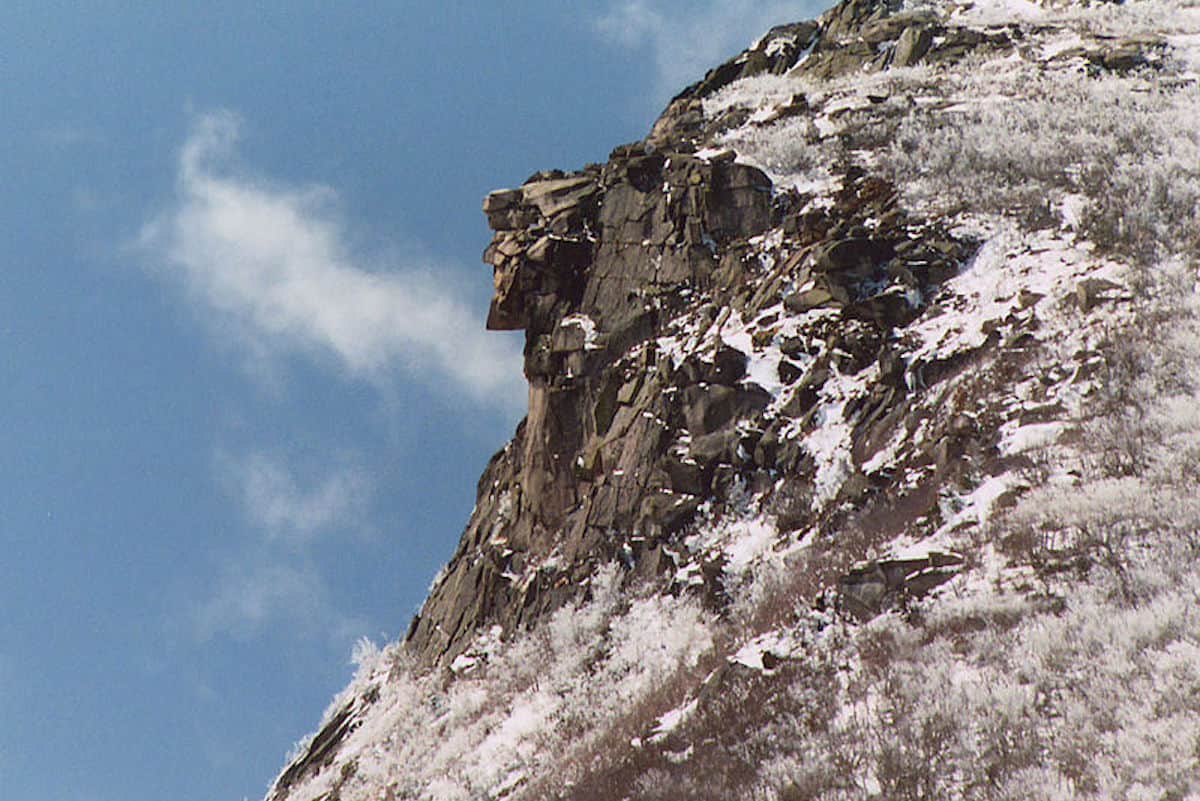New Hampshire native River Clegg eulogizes one of the most enduring and beloved symbols of the Granite State.
This article originally appeared in our September 2015 print edition.
When I moved away from New Hampshire and began regularly interacting with people from less granite-based parts of the world, I suddenly became responsible for knowing and saying things about what makes my home state unique. New Hampshire’s motto, for example, is “Live Free or Die.” Also, New Hampshire doesn’t require seat belts or motorcycle helmets for anyone over 18. There’s a running statewide joke there that you’ve probably already put together.
We have a reputation for being politically libertarian. Our legislature passed marriage equality in 2010, and the GOP’s Ron Paul strain does seem particularly visible here. Visitors can find, on our approximately four inches of coastline, a neat boardwalk and some killer saltwater taffy. Hunting is popular but not mandatory.
More New Hampshire things: stone walls, foliage, conspicuously affordable liquor, hiking, maple syrup that is indisputably better than, and presumably different from, Vermont’s, the nation’s first presidential primary, snowmobiles.
But New Hampshire’s most enduring symbol is arguably something that’s no longer around. The Old Man of the Mountain was the name given to a granite outcropping in the White Mountains that looked uncannily like a man’s face in profile when viewed from the right angle. It was 1,200 feet off the ground and 40 feet tall, but in 2003—like so many of us who live into our thousands—the Old Man collapsed.*
The Old Man was proud and handsome, with a strong jawline, full head of hair, prominent nose, masculine brow, and enormous Adam’s apple. His stare was steady and his lips were barely open, as though calmly advising a traveling huckster to get off his property. If the Old Man had possessed hands, they would have been calloused and thick.
The Old Man would have owned one suit and worn it only to weddings and funerals; the Old Man would have voted for Eisenhower.
The Old Man would have known all the different knots and been good at tying them. If Johnny Cash had met the Old Man, they would have been friends.
The Old Man would have owned a gun but wouldn’t have been a wingnut about it.
The Old Man would have eaten bacon and eggs in the morning. Sometimes oatmeal. Had things gone differently and the Old Man had children, and then one of them decided to move to the city and join a band and get a lot of weird tattoos, the Old Man would have been fine with that.
Now, just over 12 years since his passing, likenesses of the Old Man still grace New Hampshire’s state quarters, highway signs, and license plates, not unlike a Revolutionary War hero or noteworthy bird.
What has the Granite State lost? The Old Man was quiet and tough—he was a natural totem whose stoic presence seemed more than coincidental in a state that prides itself on independence and grit. He stayed in one place his whole life; he wouldn’t have moved if you’d paid him to. Honesty, simplicity, a full understanding of how to split and stack firewood—he represented these things for me. Now that he’s gone, it’s as though we’ve lost a vital receptacle. We have nowhere else to put what went in it.
Still, I’m glad he’s not around to hear me say that. “I’m just some rocks,” he’d say. “Christ.”
*In 2004, The Simpsons lampooned the Old Man’s crumbling in the episode “Fraudcast News.” This was big doings.







